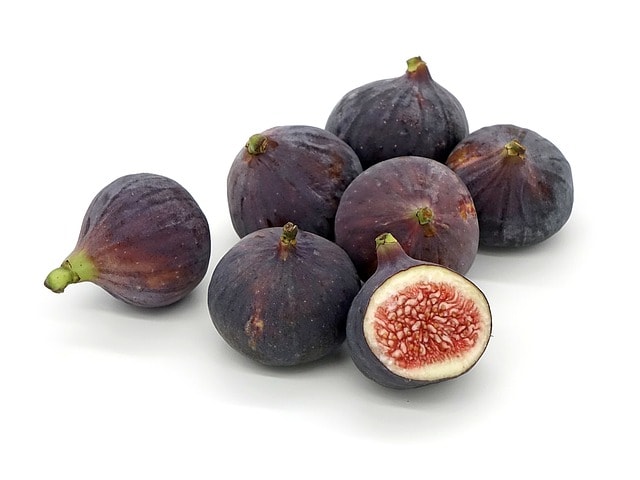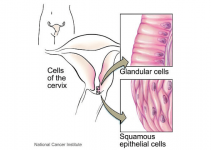 You can safely munch on fresh figs or dried figs during pregnancy. Yaaay! As of now, there is no scientific evidence documenting the side effects of eating figs.
You can safely munch on fresh figs or dried figs during pregnancy. Yaaay! As of now, there is no scientific evidence documenting the side effects of eating figs.
A crowd pleaser, right?
Nonetheless, medical practitioners advise the pregnant mother to eat figs as fruits, not as medical supplements.
Nutritional components of figs (Anjeer)
Below is the nutritional composition of figs per 50 grams
- Carbohydrates – 9.59 g
- Total sugar – 1.13 g
- Protein – 0.38 g
- Fat – 0.15 g
- Fiber 6%
- Vitamin B6 4%
- Copper 3%
- Manganese 3%
- Potassium 3%
- Pantothenic acid 3%
- GI -Medium
Health benefits of eating figs during pregnancy
Figs have a high mineral concentration than any other common vegetable or fruit. In particular, figs contain calcium, iron, potassium zinc, which are fundamental elements for a healthy pregnancy.
Figs can rejuvenate your health in the following ways:
Regulates Blood Pressure Levels
Figs help keeps your heart fit creating a healthy heart. These fruits have high concentrations of potassium and low levels of sodium.
This unique combination of the two minerals lowers blood pressure levels in expectant mothers.
The potassium content in figs is higher than in bananas – commonly praised for the mineral attribute.
Therefore, figs prevent hypertension associated with preeclampsia.[1] Figs also have a high level of polyphenol oxidants, which lessens the odds of atherosclerosis.
Maintains Cholesterol Levels
Most women suffer from High Blood Pressure during parturiency. Figs contain phytosterol, healthy Omega 3 (“good cholesterol”), and Omega 6 fatty acids that help reduce cholesterol levels.
In addition, the pectin element helps lower cholesterol level in the body.
These healthy compounds reduce cholesterol levels while keeping arteries healthy and flexible. The dietary fiber in figs cleans the cholesterol out of the body.
Aids Absorption of Iron
Figs are rich in vitamin. This vitamin assists in the absorption of iron in the body. Therefore, figs prevent would-be mothers from anemia.
Source of natural sugars
Figs contain 9.59/50 grams of natural sugars. This is cognizant since figs are sweet in taste and fulfill glucose cravings frequent with pregnant women.
Figs Boost Calcium Intake
Calcium is an aphrodisiac that helps in the development of bones and teeth of both mother and fetus.
In addition, consumption of figs strengthens bones of the mother during and after pregnancy, thus making her fit and strong to take on nursing duties.
Fetal Brain development
Figs are a rich source of Omega-3 and folate. Thus, eating figs during pregnancy contributes to the development of the fetal brain.
Maintains a Balanced Diet
Figs keep your dietary habits in check. Due to its alkaline nature, figs curbs hunger and control cravings. During pregnancy, most eating habits change.
There is an increased craving for certain foods in general. If left unchecked these cravings lead to serious conditions like gestational diabetes. Therefore, figs minimize such conditions.
Reduces Anemia
Figs help reduced anemia, which is caused by iron deficiency. Iron deficiency can lead to restricted oxygen supply to the fetus.
Figs provide adequate Iron in the body thus inhibiting fatigue and anemia.
Boosts Digestion
Fresh or dried figs contain huge amounts of fiber, in contrast to any other tropical fruit or vegetable. This dietary fiber regulates the bowel movement and helps to alleviate constipation.
Moreover, the probiotics contained in the figs nourish the good gut bacteria thus aiding digestion.
Relieves morning sickness
This is the phase most women hate – morning sickness. Most emotions and sensory nerves act-up.
The discomfort is untold. Most women hate to tell of the horrendous trips to the bathroom and appending nausea.
What you may not know is that figs help many women cruise smoothly through this phase. Figs contain Vitamin B6, which might reduce morning sickness.
Essentially, Vitamin B6 aids the production of amino acids, proteins, carbohydrates in the body.
This wonder compound is vital for brain development and healthy nervous system of the fetus.
Pretty and healthy skin
Omega 3 fatty acids make healthy hair and skin regimen. This brings a lot more goodness in pregnant women.
Figs also contain a chemical called psoralen, which is useful in skin pigmentation treatment. Lastly, figs are also good in the creation of a pregnancy mask (melasma).
How to eat figs in pregnancy
a. Fresh Figs
Fresh figs are the best way to consume figs; fresh figs make a good late afternoon snack.
b. Dried figs
Carry some dried figs in your handbag. This comes in handy when you develop odd time cravings.
c. Sweets
Pregnancy comes with increased sensory taste buds. In case you develop a craving for sweets, you can include the figs in your milkshake or ice cream.
d. Salads
This is an alternative to eating figs directly. Adding figs to a healthy and yummy diet is not only nutritious but helps in fetal development.
You can also try infusing figs into yummy dishes and make your pregnancy a delightful experience.
So, are figs harmful during pregnancy?
Once again, they are not harmful.
However, a doctor may restrict the consumption of figs during pregnancy based on the medical condition of the would-be mother. Generally, it is not harmful to eat figs during pregnancy.
Image: Pixabay
References



